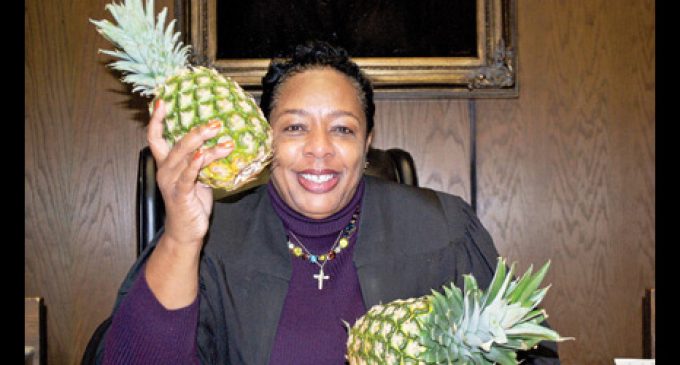Drug court offers young defendants a fresh start

Juvenile offenders who are battling drug problems have a new opportunity to make a fresh start in life, thanks to the emergence of Forsyth County’s Reclaiming Futures Juvenile Drug Court.
Thirteen youth came before District Court Judge Denise Hartsfield in Courtroom 3C of the Forsyth County Hall of Justice last week to receive their first set of instructions and mandates. Most of the offenders were 15 or 16 years of age, and almost all admitted to using marijuana daily. Through the drug court, which is supported by a grant from the U.S. Department of Justice, youth ages 12–16 will have access to a variety of treatment options and programs designed to help them get on the right path. It is a far cry from a traditional courtroom setting where youth could face harsh punishments for their drug-related offenses.
Many of the youth – who were referred to the court by other judges, counselors or drug treatment providers – have been expelled from school or simply refuse to go, according to their mothers. Judge Hartsfield told the teens that school attendance would be mandatory throughout the duration of the program, which could last anywhere from nine to 18 months, depending on the individual needs of the youth.
“It’s exciting,” said Chief of Court Stan Clarkson, who has been heavily involved in Reclaiming Futures, a community-based youth drug treatment collaborative, for years. “It’s a good opportunity to bring a treatment focus for kids who really need some redirection in their lives.”
Despite the seriousness of the circumstances that brought the group together, Hartsfield kept the mood intentionally light during the inaugural session. She cracked jokes and conversed easily with the young defendants, professing her staunch support of their journeys and unflinching belief in their respective abilities to be successful. Hartsfield brought along two pineapples to symbolize the role of the court in the youths’ lives.
“Since the pilgrims came in colonial days, the pineapple has been a symbol that means welcome,” she said. “I want everyone to feel welcome and to be very comfortable on this journey… There are going to be some slips – there are going to be some falls – but the pineapple tells us that we’re all welcome here and we’re all working together.”
Hartsfield likened the teens to the fruit, which she said has a “rough, prickly” exterior, but “what’s inside is fleshy, juicy, sweet and absolutely wonderful.” Hartsfield told the youth that many of the defendants who come before her – both young and old – land in her courtroom because of an alcohol or drug addiction.
“One of the goals that I would have is trying to make sure that you never have to see adult court,” she said. “…I anticipate that we’re going to have a great deal of pineapples in here, and we’re going to celebrate some folks.”
The Reclaiming Futures court differs from traditional juvenile court because it is treatment-focused, Hartsfield said. Because it is grant-supported, program leaders have access to resources that aren’t traditionally available in juvenile courts, such as regular drug testing and research-based assessment tools that aid the treatment team in identifying the best possible treatment program for each offender, Hartsfield said. Youth who adhere to the court’s directions will be rewarded with a variety of incentives in Hartsfield’s “treasure box,” ranging from gift cards to event tickets. Those who do not comply will receive sanctions, everything from required book reports to detention, if necessary, she said.
The Forsyth County Adult Drug Court became one of the first in the state when it was implemented in 1996 as one of five pilot programs in North Carolina. Both courts fell victim to state budget cuts. The juvenile court has been defunct since 2011.
“We’re extremely fortunate and very, very happy to be able to start this court up again,” Hartsfield told those present in the courtroom for the start of the program last week. “I know that we need this in this community … this is indeed a great day in Forsyth County.”
Attorney Eric Ellison was tapped to represent the young defendants.
“This is going to make just a huge impact on the young kids in our community,” he said of the program. “Hopefully, it will prevent them from entering the adult system.”
So far, participants in the program are all people of color, and Ellison said last week that he hoped their interaction with black professionals would help to inspire the youth to want to pursue their own dreams and goals.
“Culturally speaking, maybe these youth will be able to identify (with us) and we might be able to close the gap on the people who are running this courtroom and the people who are serving (in it),” he said.
Reclaiming Futures Project Director Mina Cook said the drug court program will fill a much needed niche in the local sector.
“(Reclaiming Futures) is about better treatment, more treatment and beyond treatment. Drug court is a really beautiful example of those three things working together,” she remarked. “…This is a vehicle for everybody who’s invested in the kids’ success to come together.”













